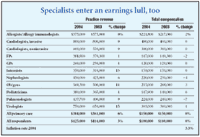Article
Exclusive Survey: The earnings freeze-now it's everybody'sproblem
Specialists as well as primary care doctors fell behind inflationlast year.

That distinction is beginning to disappear, though, as the earnings virus in primary care infects the entire profession. It's evidenced in the latest Medical Economics Continuing Survey, which sampled office-based MDs and DOs in 23 specialties. Total median compensation for all respondents uncharacteristically plateaued in 2004 at $180,000, the same as it was in 2003. It was a familiar feeling for primary care doctors, who repeated their performance in 2003 and 2002, netting $150,000. However, eight of 19 nonprimary care specialties also were in the doldrums, either losing ground or failing to gain any. Nephrologists, for example, made $220,000 in 2004, down 4 percent. Invasive cardiologists gained no ground on the $400,000 earnings they posted in 2003. Meanwhile, physicians in four other specialities registered gains of 2 percent or less.


With third-party payers enjoying the upper hand, it's not surprising that the growth in practice revenue-what you collect-has been weak. It increased only 3 percent in 2004 for all respondents. However, there's another possible reason why collections have slowed-cost-shifting to patients in the form of higher copays, coinsurance, and, most significantly, deductibles (see "Collecting just got harder" in the May 20, 2005, issue of Medical Economics, available at http://www.memag.com. The difficulty of getting patients to pay is already a red-flag issue for hospital chain HCA, and physicians won't be spared either, says consultant H. Christopher Zaenger in Barrington, IL. "Receivables," says Zaenger, "are becoming a bigger problem."





